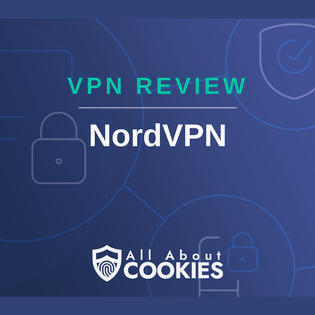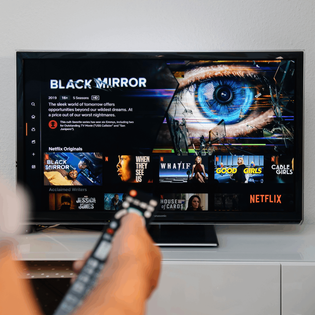Advertiser Disclosure
All About Cookies is an independent, advertising-supported website. Some of the offers that appear on this site are from third-party advertisers from which All About Cookies receives compensation. This compensation may impact how and where products appear on this site (including, for example, the order in which they appear).
All About Cookies does not include all financial or credit offers that might be available to consumers nor do we include all companies or all available products. Information is accurate as of the publishing date and has not been provided or endorsed by the advertiser.
Editorial Policy
The All About Cookies editorial team strives to provide accurate, in-depth information and reviews to help you, our reader, make online privacy decisions with confidence. Here's what you can expect from us:
- All About Cookies makes money when you click the links on our site to some of the products and offers that we mention. These partnerships do not influence our opinions or recommendations. Read more about how we make money.
- Partners are not able to review or request changes to our content except for compliance reasons.
- We aim to make sure everything on our site is up-to-date and accurate as of the publishing date, but we cannot guarantee we haven't missed something. It's your responsibility to double-check all information before making any decision. If you spot something that looks wrong, please let us know.
Best for Low Price and Speeds
-
Two-year pricing is less than half the cost of ExpressVPN
-
Faster download speeds overall
-
Too many confusing plans
Best for Server Location Choices
-
Allows access to servers in more countries
-
Also fast download speeds
-
One of the priciest VPNs
We’ve tested both services in a side-by-side comparison and NordVPN is the better choice for most people. It costs less ($2.99 vs. $8.32 per month at the time of writing), has faster speeds, and provides a higher server count than ExpressVPN.
Both VPNs have a lot going for them, including generally speedy connections, high-level security, and the ability to unblock streaming content. And ExpressVPN might be the better choice if you want to connect to specific server locations, as it provides access to more countries. But our firsthand experience and testing show that NordVPN generally matches or beats ExpressVPN across multiple categories.
Let’s explore our ExpressVPN vs. NordVPN review to dig deeper into details about prices, features, speed tests, and more.
ExpressVPN vs. NordVPN: prices
ExpressVPN vs. NordVPN: features
NordVPN vs. ExpressVPN: streaming support
ExpressVPN vs. NordVPN: internet speeds
ExpressVPN vs. NordVPN: compatibility and ease of use
ExpressVPN vs. NordVPN: customer service
NordVPN vs. ExpressVPN FAQs
ExpressVPN vs. NordVPN: which is better?
ExpressVPN vs. NordVPN at a glance
Your specific virtual private network (VPN) needs might vary, but there are typically a few factors that interest many users when comparing multiple services. This includes cost, speed, compatibility, reliability, security, and privacy.
Both ExpressVPN and NordVPN are generally reliable, secure, and private. They’re also compatible with plenty of different devices. And you can use either VPN to unblock regional Netflix libraries and other streaming content.
But you’ll find some differences between their prices, server counts and locations, and VPN protocols (which can affect internet connection speeds).
How do ExpressVPN and NordVPN compare?
 ExpressVPN |
 NordVPN Our Pick
|
|
| Price | Starts at $6.67/mo | Starts at $2.99/mo |
| Max # of connected devices | 8 | 6 |
| 24/7 customer support | ||
| Compatibility | Android, iOS, Windows, macOS, Linux, Google Chrome, Mozilla Firefox, Microsoft Edge, Android TV, Fire TV, Fire TV Stick, Kindle Fire | Android, iOS, Windows, macOS, Linux, Google Chrome, Mozilla Firefox, Microsoft Edge, Android TV |
| # of servers | Server locations in 94 countries | 5,000+ servers in 59 countries |
| VPN protocol | Lightway, OpenVPN, IKEv2, L2TP/IPsec | OpenVPN, NordLynx (WireGuard), IKEv2/IPsec |
| No-logs policy | No logs | No logs |
| Unblocks Netflix? | ||
| Get ExpressVPN | Get NordVPN |
The primary differences between ExpressVPN and NordVPN include:
- Price
- Max number of connected devices
- Number of servers
- VPN protocols
The price of ExpressVPN ranges from $6.67–$12.95/mo. The price of NordVPN ranges from $2.99–$14.99/mo. See more details about prices.
The max number of connected devices, or max number of simultaneous connections to a VPN, is five for ExpressVPN and six for NordVPN. These are average numbers compared with what other VPNs offer and potentially behind the trend of providers (including Surfshark) offering unlimited connections.
The total number of servers skews in the favor of NordVPN, which offers over 5,000 servers in 59 countries. But ExpressVPN provides access to more countries (94).

More servers could mean less server load, or how congested a server gets from users. But more countries could mean more opportunities to unblock streaming content.”
VPN protocols provide direction for how information is sent through an encrypted connection. Both ExpressVPN and NordVPN use popular and secure protocols, including OpenVPN and IKEv2. But each VPN also has its own next-generation protocol, NordLynx for NordVPN and Lightway for ExpressVPN. See more details about servers and VPN protocols.
ExpressVPN vs. NordVPN: prices
| ExpressVPN | NordVPN Our Pick
|
|
| Price range | $6.67–$12.95/mo | $2.99–$14.99/mo |
| Best value plan | 12-month plan for $6.67/mo | 24-month plan for $2.99/mo |
| Money-back guarantee | 30 days | 30 days |
| See Full Pricing Details | See Full Pricing Details |
ExpressVPN costs between $6.67–$12.95/mo, with its lowest-priced plan coming in at $6.67/mo for 12 months.
NordVPN costs between $2.99–$14.99/mo, with its lowest-priced plan coming in at $2.99/mo for 24 months.
NordVPN is the better choice for most people. It costs less ($2.99/mo vs. $6.67/mo), has faster speeds, and provides a higher server count than ExpressVPN.
ExpressVPN is expensive, no matter which plan you choose. NordVPN can be expensive, but its cheapest options are more budget-friendly if you want to save money on a VPN. Both VPN services provide 30-day money-back guarantees for full refunds within your first month.
ExpressVPN vs. NordVPN: features
| Features | ExpressVPN | NordVPN Our Pick
|
| Number of servers | Server locations in 94 countries | 5,000+ servers in 59 countries |
| No-logs policy | No logs | No logs |
| VPN headquarters | British Virgin Islands | Panama |
| Encryption | AES-256 | AES-256 |
| VPN protocol | Lightway, OpenVPN, IKEv2, L2TP/IPsec | OpenVPN, NordLynx (WireGuard), IKEv2/IPsec |
| Kill switch | ||
| Split tunneling | ||
| Double VPN | ||
| Netflix support | ||
| Torrenting support | ||
| Visit ExpressVPN | Visit NordVPN |
NordVPN and ExpressVPN provide plenty of similar features, including a kill switch, split tunneling, and torrenting support. They also have strict no-logs policies with independent audits done by PricewaterhouseCoopers.
And both VPNs are headquartered in countries or territories that aren’t part of the Five, Nine, or 14 Eyes Alliances. Both Panama (NordVPN) and the British Virgin Islands (ExpressVPN) have strict data protection laws.
The differences in features are primarily found in the number of servers and the available VPN protocols.
ExpressVPN doesn’t currently publish or release information about its total number of servers, but it was once thought to have around 3,000 servers in 94 countries. NordVPN has more than 5,000 servers in 59 countries. So the NordVPN server count is higher, but ExpressVPN has servers in more countries.
More servers could mean less server load, or how congested a server gets from users. But more countries could mean more opportunities to unblock streaming content. Note that 59 countries is still likely more than enough for the average VPN user.
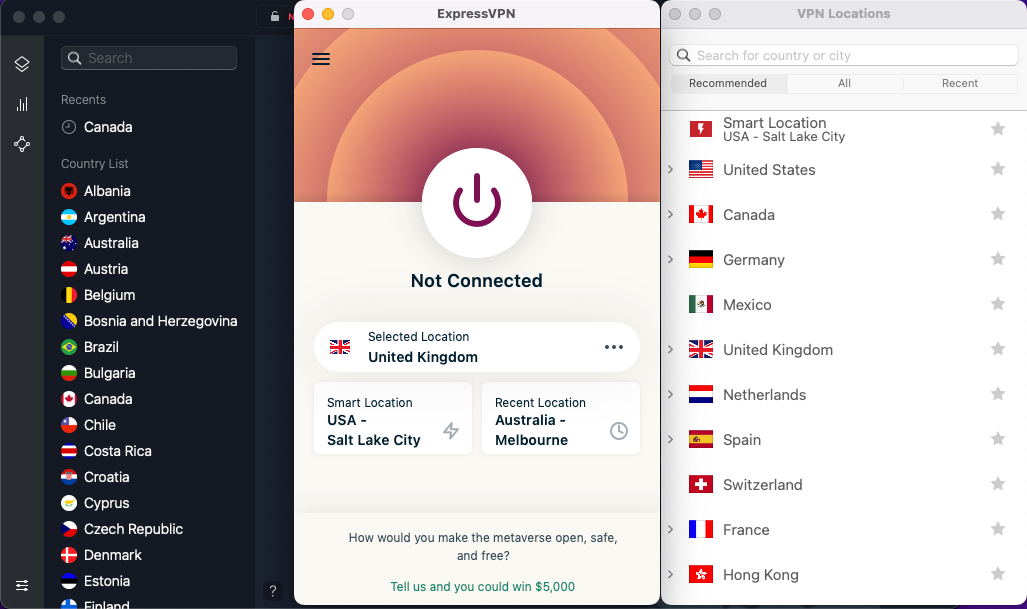
The main difference between VPN protocols from both providers is that ExpressVPN has Lightway and NordVPN has NordLynx. They’re both fast and secure next-generation protocols, but NordLynx tends to have faster speeds than Lightway.
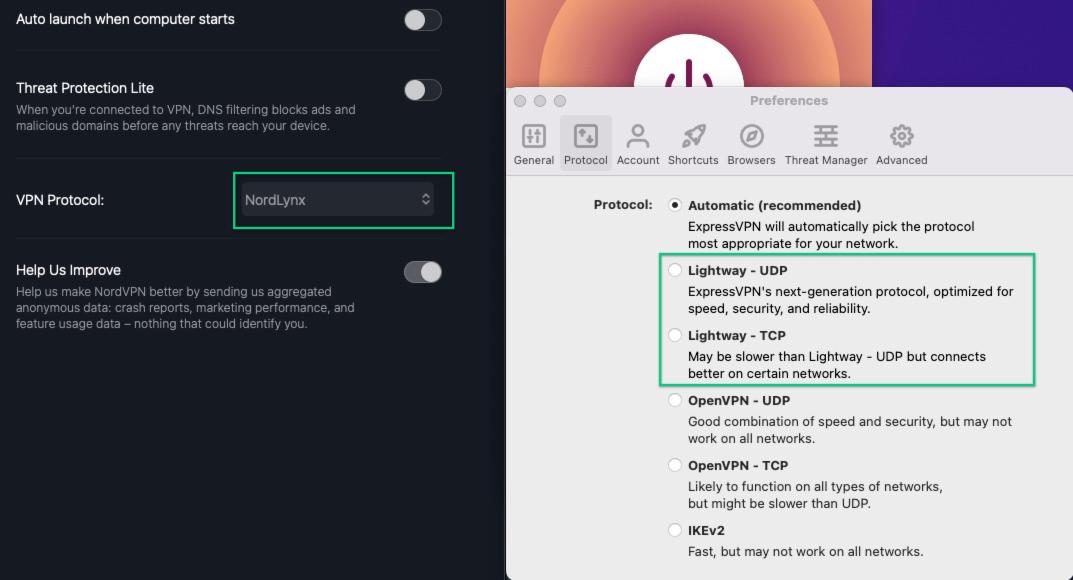
NordVPN also offers one more feature that ExpressVPN doesn't: double VPN, also called multi-hop. This likely isn't a critical feature for most VPN users, but it provides extra security for anyone who worries their access to the internet might be limited or blocked.
NordVPN vs. ExpressVPN: streaming support
| Platform | ExpressVPN | NordVPN Our Pick
|
| Netflix | ||
| Amazon Prime Video | ||
| Hulu | ||
| BBC iPlayer | ||
| Disney+ | ||
| HBO Max |
We tested each of the above streaming platforms with both VPNs individually and found ExpressVPN and NordVPN worked successfully for everything listed. This included loading the streaming websites on Chrome and playing a show or movie to see if it had any lag or other issues.
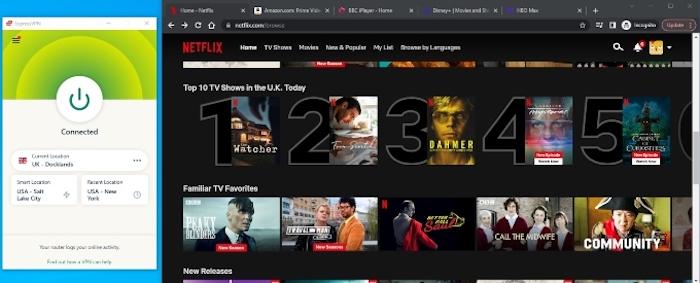
We didn’t notice any actual differences between using either VPN service to unblock streaming content. Everything loaded fine as long as we were connected to a VPN server where the applicable streaming content was available.
For example, BBC iPlayer worked with both VPNs while we were connected to servers in the U.K.
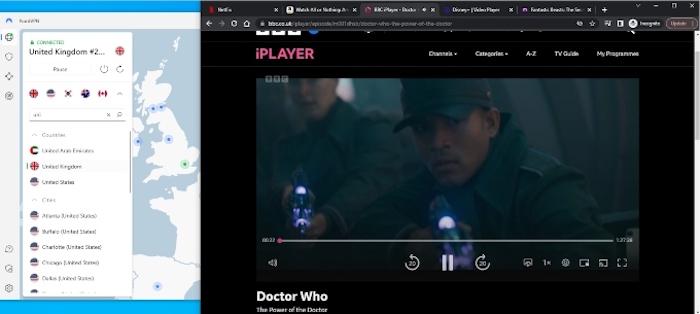
ExpressVPN vs. NordVPN: internet speeds
We test internet speeds before and after establishing secure VPN connections to see if a service significantly reduces our speed. It’s almost guaranteed that using a VPN will reduce your internet speed to some degree.
But we want to see if it’s a substantial decrease that could affect your regular bandwidth usage, whether from browsing websites, streaming content, or playing games.
We run a speed test before connecting to any VPN so we can get a baseline speed. Then we run speed tests while connected to VPN servers in different locations and see if there’s a significant difference. Keep in mind that connecting to servers that are far away typically slows down your internet connection more than connecting to servers that are nearby.
We ran these speed tests using the ExpressVPN Windows app and NordVPN Windows app on a desktop computer from a physical location in the U.S.
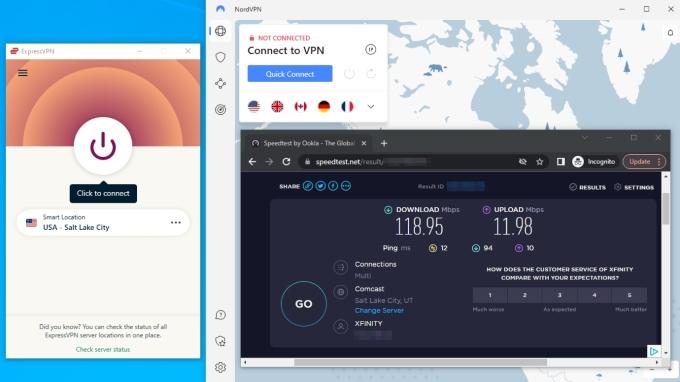
ExpressVPN vs. NordVPN speed test results
| Server location | ExpressVPN | NordVPN Our Pick
|
| US |
|
|
| Canada |
|
|
| UK |
|
|
| AU |
|
|
| Read Our ExpressVPN Review | Read Our NordVPN Review |
To make it a fair comparison, we connected to servers in the same cities for both VPNs. The cities were Salt Lake City (U.S.), Toronto (Canada), London (U.K.), and Sydney (Australia).
NordVPN had faster download speeds overall in the locations we tested. That’s not to say Nord blew ExpressVPN out of the water (these are often considered two of the fastest VPNs available), but Nord ended up with better results.
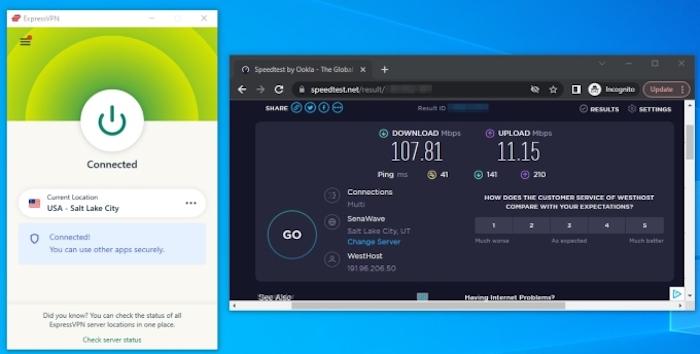
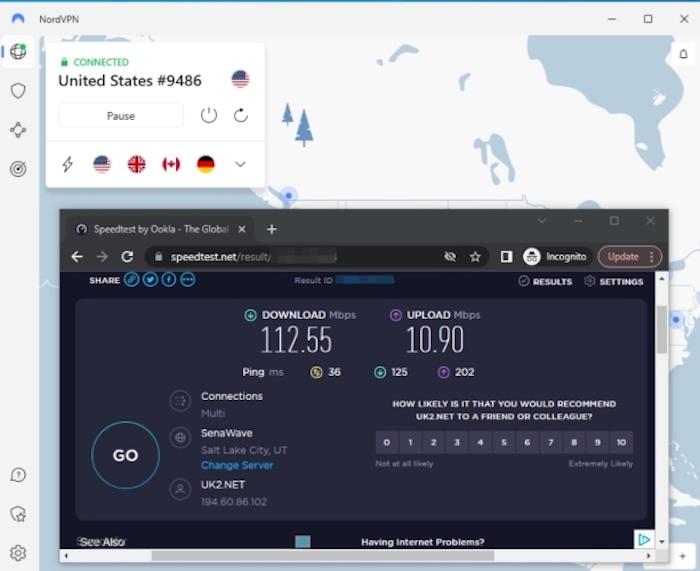
We also took note of our latency before and after connecting to VPN servers. Your latency is basically a measure of how long it takes networks to communicate. Lower latency is better.
Our baseline latency was 12 and the highest latency we reached was 208, which occurred while using NordVPN to connect to a server in Sydney. ExpressVPN had the lower latency numbers on average, but it wasn’t too different between the two VPN providers.
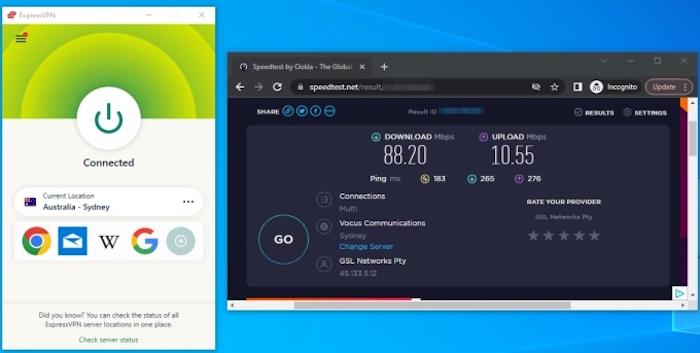
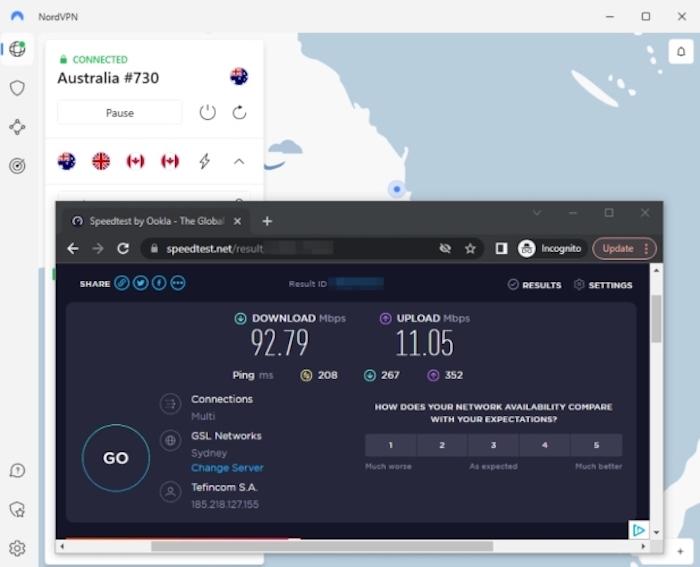
NordVPN vs. ExpressVPN latency comparison
| Server location | ExpressVPN | NordVPN |
| US | 41 ms | 36 ms |
| Canada | 64 ms | 56 ms |
| UK | 134 ms | 142 ms |
| AU | 183 ms | 208 ms |
ExpressVPN vs. NordVPN: compatibility and ease of use
| ExpressVPN | NordVPN Our Pick
|
|
| Windows | ||
| macOS | ||
| Android | ||
| iOS | ||
| Linux | ||
| Router | ||
| Smart devices |
ExpressVPN and NordVPN were both easy to download and install on our desktop computer using Windows. And both VPNs also have apps for loads of other devices, operating systems, browser extensions, and mobile apps. This includes macOS, Apple iPhones, Android phones, and Linux.
You can also use these VPNs with routers and different types of smart devices that might not have access to VPN apps. To be clear, you can’t set up the ExpressVPN app or NordVPN app on a device that’s not compatible. But you can use a feature called Smart DNS to unblock streaming services on different devices, such as an Xbox or Smart TV.
ExpressVPN offers Smart DNS functionality through its MediaStreamer feature. NordVPN offers Smart DNS through its SmartPlay feature.
The interfaces for both Windows apps are generally intuitive and easy to use. We had no issues finding server lists, quick connect buttons, or getting into the settings to find other features, such as the kill switch or split tunneling.
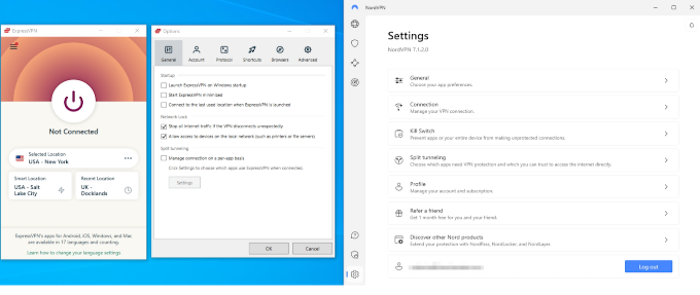
If there was anything slightly frustrating about our experiences with either service, it’s that we couldn’t figure out how to log in to ExpressVPN without going through a verification process (getting a code via email). Multi-factor authentication is actually a helpful security feature, but it could make things difficult if you share an account with other people.
ExpressVPN vs. NordVPN: customer service
| ExpressVPN | NordVPN Our Pick
|
|
| 24/7 live chat | ||
| Phone | ||
| Support forums | ||
| Online guides |
Both ExpressVPN and NordVPN offer 24/7 customer service through live chat, email, and online guides. There’s no phone number to call or any official online support forum for either VPN, but you can check out the unofficial subreddits for both providers to interact with other customers.
Not every VPN provider (such as Proton VPN) offers 24/7 live chat support, or you might have to be a paying subscriber to access the live chat feature. But you don’t even have to be a customer to interact with ExpressVPN or NordVPN customer service, which can be helpful if you have specific questions before signing up for a subscription.
We used the live chat features from both companies and found the representatives to be polite, easy to understand, and helpful. We also didn’t have to wait more than a few minutes to be connected to someone.
NordVPN vs. ExpressVPN FAQs
Is NordVPN better than ExpressVPN?
We think so because NordVPN provides faster speeds and more servers. That’s while matching many of the features that ExpressVPN provides, including a kill switch, split tunneling, and unblocking streaming content.
And the NordVPN price starts out at $2.99 per month, whereas ExpressVPN starts at a much more expensive $8.32 per month.
How much faster is ExpressVPN than NordVPN?
ExpressVPN isn’t faster than NordVPN. Overall, NordVPN provides faster speeds than ExpressVPN, likely due to its next-generation protocol, NordLynx.
ExpressVPN also has a next-generation protocol, Lightway, but NordLynx was faster during the speed tests we ran. These tests involved measuring our internet speeds while connected to different VPN servers worldwide.
What is the monthly cost for NordVPN?
NordVPN costs between $2.99–$14.99/mo depending on the subscription plan. Here’s the complete breakdown:
- One-month plan: $11.99 to $14.29 per month
- One-year plan: $4.49 to $6.79 per month
- Two-year plan: $2.99 to $5.29 per month
Is ExpressVPN worth the money?
Unless you need access to servers in a specific country, ExpressVPN likely isn’t worth the money. NordVPN and other companies typically provide everything the average user needs in a VPN. But most other VPNs are cheaper than ExpressVPN.
For example, NordVPN is faster than ExpressVPN and starts at $2.99/mo, whereas ExpressVPN starts at $6.67/mo.
Which VPN is more secure, ExpressVPN or NordVPN?
Both VPNs generally provide high levels of privacy and security due to their AES-256 encryption and secure VPN protocols.
They also have DNS leak protection, aren’t prone to IP address or WebRTC leaks, and they both have strict no-logs policies that have been audited by an independent third party. Based on security alone, you likely can’t go wrong with either ExpressVPN or NordVPN.
ExpressVPN vs. NordVPN: which is better?
ExpressVPN provides high levels of security and privacy, can unblock streaming services, and offers fast speeds. But NordVPN does all the same things, costs less, and even outperforms ExpressVPN for speed.
Between the two options, we recommend NordVPN. But keep in mind that ExpressVPN could make sense if it has a feature you want or need, such as a server location that’s not available with NordVPN.
Still deciding? Learn more about each VPN in our Express VPN review and our NordVPN guide.
-
High-quality VPN offering safety and speed
-
Loads of servers for multiple connection options
-
Works with popular streaming services, including Netflix
-
Too many confusing plans

